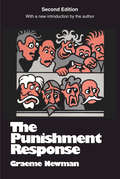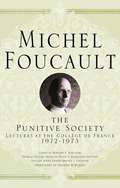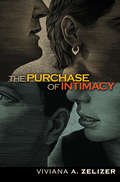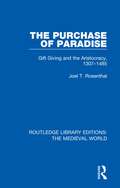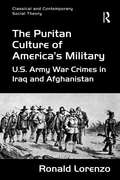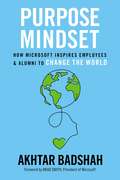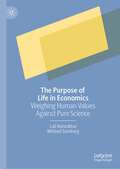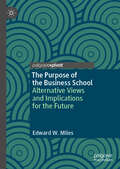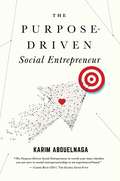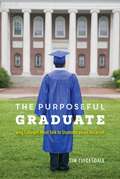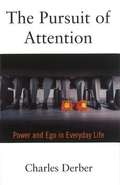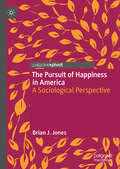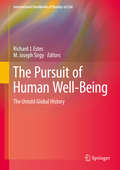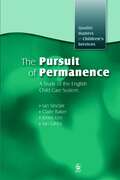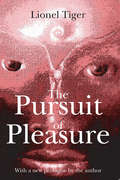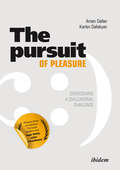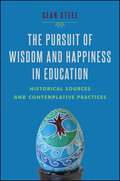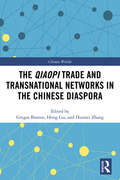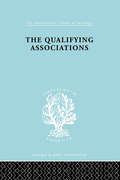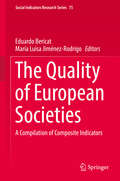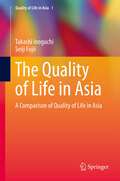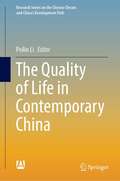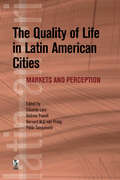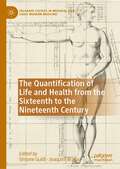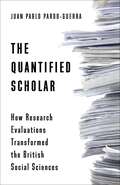- Table View
- List View
The Punishment Response
by Graeme NewmanPunishment occupies a central place in our lives and attitudes. We suffer a profound ambivalence about its moral consequences. Persons who have been punished or are liable to be punished have long objected to the legitimacy of punishment. We are all objects of punishment, yet we are also its users. Our ambivalence is so profound that not only do we punish others, but we punish ourselves as well. We view those who submit too willingly to punishment as obedient verging on the groveling coward, and we view those who resist punishment as disobedient, rebels. In The Punishment Response Graeme Newman describes the uses of punishment and how these uses change over time.Some argue that punishment promotes discrimination and divisiveness in society. Others claim that it is through punishment that order and legitimacy are upheld. It is important that punishment is understood as neither one nor the other; it is both. This point, simple though it seems, has never really been addressed. This is why Newman claims we wax and wane in our uses of punishment; why punishing institutions are clogged by bureaucracy; why the death penalty comes and goes like the tide.Graeme Newman emphasizes that punishment is a cultural process and also a mechanism of particular institutions, of which criminal law is but one. Because academic discussions of punishment have been confined to legalistic preoccupations, much of the policy and justification of punishment have been based on discussions of extreme cases. The use of punishment in the sphere of crime is an extreme unto itself, since crime is a minor aspect of daily life. The uses of punishment, and the moral justifications for punishment within the family and school have rarely been considered, certainly not to the exhaustive extent that criminal law has been in this outstanding work.
The Punitive Society (Lectures at the Collège De France, 1972-1973 #2)
by Michel FoucaultThese thirteen lectures on the 'punitive society,' delivered at the Collège de France in the first three months of 1973, examine the way in which the relations between justice and truth that govern modern penal law were forged, and question what links them to the emergence of a new punitive regime that still dominates contemporary society.
The Purchase of Intimacy
by Viviana A. ZelizerIn their personal lives, people consider it essential to separate economics and intimacy. We have, for example, a long-standing taboo against workplace romance, while we see marital love as different from prostitution because it is not a fundamentally financial exchange. In The Purchase of Intimacy, Viviana Zelizer mounts a provocative challenge to this view. Getting to the heart of one of life's greatest taboos, she shows how we all use economic activity to create, maintain, and renegotiate important ties--especially intimate ties--to other people. In everyday life, we invest intense effort and worry to strike the right balance. For example, when a wife's income equals or surpasses her husband's, how much more time should the man devote to household chores or child care? Sometimes legal disputes arise. Should the surviving partner in a same-sex relationship have received compensation for a partner's death as a result of 9/11? Through a host of compelling examples, Zelizer shows us why price is central to three key areas of intimacy: sexually tinged relations; health care by family members, friends, and professionals; and household economics. She draws both on research and materials ranging from reports on compensation to survivors of 9/11 victims to financial management Web sites and advice books for same-sex couples. From the bedroom to the courtroom, The Purchase of Intimacy opens a fascinating new window on the inner workings of the economic processes that pervade our private lives.
The Purchase of Paradise: Gift Giving and the Aristocracy, 1307-1485 (Routledge Library Editions: The Medieval World #42)
by Joel T. RosenthalOriginally published in 1972, The Purchase of Paradise is an account of medieval philanthropy and looks at the late medieval aristocracy as a social, rather than political group. The book analyses their voluntary behaviour, their gift giving and the Church, and addresses the nature of charity in the Middle Ages, providing an insight into the noble families of the time. The book depicts charitable practices within the family, such as the buying of prayers for relatives, and the family traditions of support for favoured houses lasting through several generations. The book shows that the family was the most operative unit for most forms of benefaction and ecclesiastical contact, and that the hard necessities of baronial politics were often ignored when men turned their thoughts to philanthropy and prayers for their immortal souls. The book will of value to historians and sociologists alike, as well as those working in the field of anthropology.
The Puritan Culture of America's Military: U.S. Army War Crimes in Iraq and Afghanistan (Classical and Contemporary Social Theory)
by Ronald LorenzoThis book explores Puritanism and its continuing influence on U.S. and military law in the Global War on Terror, exploring connections between Puritanism and notions of responsibility in relation to military crimes, superstitious practices within the military, and urges for revenge. Engaging with the work of figures such as Durkheim, Fauconnet and Weber, it draws on primary data gathered through participation and observation at the U.S. Army courts-martial following events at Abu Ghraib, Operation Iron Triangle, the Baghdad canal killings and a war crimes case in Afghanistan, to show how Puritan cultural habits color and shape both American military actions and the ways in which these actions are perceived by the American public. A theoretically sophisticated examination of the cultural tendencies that shape military conduct and justice in the context of a contemporary global conflict, The Puritan Culture of America’s Military will appeal to scholars across the social sciences with interests in social theory and sociology, cultural studies, politics and international relations and military studies.
The Purpose Mindset: How Microsoft Inspires Employees and Alumni to Change the World
by Akhtar BadshahNew research shows that today, more than ever, employees want to contribute to something greater than themselves. Learn the innovative strategies Microsoft pioneered that created a virtuous cycle of giving and volunteerism that has benefitted the company and fulfilled its employees while making the world a better place.Early on in the Microsoft story, Bill Gates and other key executives met to decide how they would incentivize employees to make a charitable impact. The status quo at that time was to offer some small percentage of your paycheck as a pretax deduction to a charity selected by your company. Microsoft decided to so something revolutionary instead.The Purpose Mindset tells the inside story behind how Microsoft built its culture of giving, including powerful stories from Microsoft alumni who were in the room when these decisions were made or who went on to make powerful change in the world, emboldened by their time at Microsoft.The Purpose Mindset also tells the story of how this culture of giving that has been so successful at Microsoft in regard to job satisfaction, recruiting, and employee retention can be duplicated in your own work life, whether you are a business leader or you are seeking employment at a company that contributes to something greater than themselves. Throughout these pages, charitably-engaged alumni such as author Akhtar Badshah, the head of Microsoft&’s Philanthropy program from 2004-2014, take readers through the first-of-its-kind decisions that have empowered and incentivized employees:Hear the first-hand accounts from interviews with Microsoft executives such as Jeff and Tricia Raikes, Patrick Awuah, Paul Maritz, and many others. Learn how Microsoft&’s early decision to encourage employees to support causes personal to them was a key impetus to multiplying the impact.Get insider accounts on the key decisions Microsoft has made along its journey to make individual philanthropy a core element of their culture.See how its culture of giving is one of the key elements to Microsoft&’s success in attracting and retaining top talent.
The Purpose of Life in Economics: Weighing Human Values Against Pure Science
by Michael Szenberg Lall RamrattanThis book is a compilation of economic views on the purpose of life. It follows a unique approach, starting with propositions from diverse fields that act as governing laws of the purpose of life in economics, then guiding the reader through the physical, philosophical, and psychological views of the purpose of life, as economics and economic theories can find their roots in all these areas. The book concludes with the purpose of life presented through economic doctrines (from the pre-classical, to classical, to neo-classical schools of economic thought), through the lens of economic development, and from the perspective of several religious doctrines.
The Purpose of the Business School: Alternative Views and Implications for the Future
by Edward W. MilesIn the mid-20th century, university-based business schools re-oriented themselves to increased alignment with the preferences of the university and decreased alignment with the preferences of business. This re-alignment has caused multiple observers to question the effectiveness of current-day business schools. For example, recent discussions have lamented that business schools are engaged in research that does not influence the practice of business. This book engages these debates, arguing that all judgments about the effectiveness of business schools are rooted in assumptions about what the purposes of the business school appropriately are and that many of those assumptions are unstated and not subjected to debate. The author weaves a unique blend of complexity theory, philosophy of science, and the nature of professions to articulate those goals and assess the effectiveness at meeting them. The book traces parallel discussions regarding the purpose of the university in the writings of Aristotle and Wilhelm von Humboldt and ties those discussions to current debates. This book will inform business faculty and administrators of the degree to which university-based business schools are balancing multiple purposes which include discovery of knowledge, creating knowledge that informs the practice of business, training professionals, and instilling ethical principles in its training of those professionals.
The Purpose-Driven Social Entrepreneur
by Karim Abouelnaga"An introspective look at building a startup with long-range vision.... No matter what way one chooses to digest the information, it will certainly be of value to businesspeople at all levels of experience." - Kirkus ReviewsSome people succeed in the business world; others succeed in the social sector. Very few mesh both, succeed, and create real social change. Whether you are already an entrepreneur or are thinking about an entrepreneurial journey, The Purpose-Driven Social Entrepreneur is a must-read to set yourself on a path of intention and success. In this book, Karim covers the formative early steps that help you reflect on your purpose and orient your mindset for the journey, and how to adjust and enhance your business over time. Written by a 26-year-old millennial entrepreneur who has built a multimillion-dollar education company and raised millions of dollars in philanthropy, this book is simple to follow, and a key for anyone who is ready to take their business and life to the next level. Karim's journey proves it's possible to succeed as a business person and create lasting social change. In this book, he shows us how we can achieve it too.
The Purposeful Graduate: Why Colleges Must Talk to Students about Vocation
by Tim ClydesdaleWe all know that higher education has changed dramatically over the past two decades. Historically a time of exploration and self-discovery, the college years have been narrowed toward an increasingly singular goal—career training—and college students these days forgo the big questions about who they are and how they can change the world and instead focus single-mindedly on their economic survival. In The Purposeful Graduate, Tim Clydesdale elucidates just what a tremendous loss this is, for our youth, our universities, and our future as a society. At the same time, he shows that it doesn’t have to be this way: higher education can retain its higher cultural role, and students with a true sense of purpose—of personal, cultural, and intellectual value that cannot be measured by a wage—can be streaming out of every one of its institutions. The key, he argues, is simple: direct, systematic, and creative programs that engage undergraduates on the question of purpose. Backing up his argument with rich data from a Lilly Endowment grant that funded such programs on eighty-eight different campuses, he shows that thoughtful engagement of the notion of vocational calling by students, faculty, and staff can bring rich rewards for all those involved: greater intellectual development, more robust community involvement, and a more proactive approach to lifelong goals. Nearly every institution he examines—from internationally acclaimed research universities to small liberal arts colleges—is a success story, each designing and implementing its own program, that provides students with deep resources that help them to launch flourishing lives. Flying in the face of the pessimistic forecast of higher education’s emaciated future, Clydesdale offers a profoundly rich alternative, one that can be achieved if we simply muster the courage to talk with students about who they are and what they are meant to do.
The Pursuit of Attention Power and Ego in Everyday Life (Second Edition)
by Charles DerberIn this book, Charles Derber argues that there is a general lack of social support in today's America, one which causes people to vie hungrily for attention. This book analyses the pursuit of attention in conversation--as well as in politics and celebrity culture--and demonstrates the ultimate importance of gender, class, and racial differences in competing for attention.
The Pursuit of Happiness in America: A Sociological Perspective
by Brian J. JonesEverybody wants to know what makes people happy. Artistic takes on the topic in literature, popular songs and cinema are widespread, but not terribly helpful. Psychological accounts are mostly about how to avoid unhappiness. So who actually is happy, and why? This book offers real answers from the real world of American society. Their source is the General Social Survey, a scientific poll of Americans offering some five decades of state-of-the-art data. An additional enhancement is a set of qualitative interviews commissioned by the author adding depth to the extraordinary breadth of the GSS. The approach of the book is distinctly sociological. Are married Americans happier than unmarried Americans? Does social class matter? How about college? The answers lie within this wide and deep dive into happiness in America.
The Pursuit of Human Well-Being
by Richard J. Estes M. Joseph SirgyThis handbook informs the reader about how much progress we, the human race, have made in enhancing the quality of life on this planet. Many skeptics focus on how the quality of life has deteriorated over the course of human history, particularly given World War II and its aftermath. This handbook provides a positive perspective on the history of well-being. Quality of life, as documented by scientists worldwide, has significantly improved. Nevertheless, one sees more improvements in well-being in some regions of the world than in others. Why? This handbook documents the progress of well-being in the various world regions as well as the differences in those regions. The broad questions that the handbook addresses include: - What does well-being mean? - How do different philosophical and religious traditions interpret the concept of well-being within their own context? - Has well-being remained the same over different historical epochs and for different regions and subregions of the world? - In which areas of human development have we been most successful in advancing individual and collective well-being? In which sectors has the attainment of well-being proven most difficult? - How does well-being differ within and between different populations groups that, for a variety of socially created reasons, have been the most disadvantaged (e. g. , children, the aged, women, the poor, racial, ethnic, and sexual minorities)?
The Pursuit of Permanence: A Study of the English Child Care System
by Jenny Lee Claire Baker Ian Gibbs Ian SinclairChildren in public care complain that they have too many placements. Professionals agree but little is known about the reasons for this instability or how it affects different groups of children. The Pursuit of Permanence explores this core issue for children's services. Based on the largest study of the English care system in recent years, the book examines the children (what they need and what they want), their movements into, out of and within the care system, the nature and quality of their placements and the outcomes (whether the children are settled or happy). It analyses the reasons for movements and outcomes in different groups of children, and the relative impacts of the departments, social work teams and placements. It concludes with suggestions about how the care system should work, what it should offer and how it should be managed and inspected. This detailed, innovative and comprehensive study is essential reading for all professionals and academics involved with fostering, leaving care, adoption and children's services, as well as policy makers and students on social work courses.
The Pursuit of Pleasure
by Lionel TigerPleasure is biologically desirable and good for physical and mental health. In The Pursuit of Pleasure, Lionel Tiger explores this aspect of human nature by focusing on the origins and forms of pleasure. Medical science has perfected a host of often astonishingly impressive methods for preventing, alleviating, or recovering from pain. Its opposite, pleasure, has not had such a well-funded and fully justified constituency. In fact, those committed to the understanding and pursuit of pleasure, are rarely accorded respect and a sense of significance. People have objected to the notion of pleasure for a variety of reasons. The most complex derive from religious convictions that the most morally admirable human life is marked by abstemiousness, suffering, even martyrdom. There is also a corresponding fear that people may pursue pleasure too avidly and with too strong a sense of entitlement, and the world's work will not get done. But just as there have been suspicions of the dangers of pleasure, there have also been its supporters who assert its vital and joyful centrality to human experience. The Pursuit of Pleasure favors an agnostic approach borrowed from natural science.In lively, witty, and eminently readable prose, Tiger identifies major forms of pleasure and explores their variations, now and in the past. Pleasure, says Tiger, is not a luxury but an evolutionary entitlement that deserves to be taken seriously. As we acknowledge our need for enjoyment, we understand the need to establish balance in our lives-our need for the pursuit of pleasure.
The Pursuit of Pleasure: Overcoming a Civilizational Challenge
by Arsen Dallan Karlen DallakyanThis important book unveils how the pleasure principle has taken humanity hostage to the powers of branding and consumerism, steering our most basic desires. Radically re-evaluating the notion of pleasure and arguing for a deep societal change, it shows the way to a new humanist culture.
The Pursuit of Wisdom and Happiness in Education: Historical Sources and Contemplative Practices
by Sean SteelModern scholarship has struggled to come to terms with the meaning of wisdom and its significance in the field of education. This book examines the importance of pursuing wisdom in schools by turning to ancient and medieval sources for clarification concerning the nature of wisdom. Sean Steel argues that our current emphasis on the development of rigorous critical-analytic thinking skills, on assessment, and on accountability in education has negatively impacted the ability of schools to foster an environment in which both students and teachers might pursue wisdom. Although in recent times efforts have been made to incorporate the pursuit of wisdom into schools through Philosophy for Children (P4C) and contemplative education programming, such initiatives have missed their mark. Steel therefore recommends not more accountability in education for the purpose of ensuring global competitiveness, but rather the institutional promotion of periods of leisure or schole in the school day.Drawing upon his own experiences as a teacher who has tried to encourage students to search for wisdom, the author discusses some of the challenges and pitfalls of wisdom seeking. He also offers examples of various wisdom-seeking activities that might bear fruit in the classroom.
The Qiaopi Trade and Transnational Networks in the Chinese Diaspora (Chinese Worlds)
by Hong Liu Gregor Benton Huimei ZhangOriginating in the 1820s and used for 150 years thereafter, qiaopi is the name given in Chinese to letters written home by Chinese emigrants to accompany remittances. Their key function was to preserve family ties. Although such correspondence focused principally on the provision of economic support, the qiaopi also touched on cultural, political, educational, and gender themes. This book therefore seeks to examine the qiaopi from two interconnected perspectives. One views qiaopi from a political and institutional angle, the other from a financial and social angle. Bringing together the extensive research of a group of international scholars, this multi-authored volume sheds light on the larger significance of the qiaopi for modern China. Taking an empirical, evidence-driven approach, the contributors employ a wide range of primary sources in both Chinese and English and relate their findings to scholarship in both the Chinese-speaking world and in non-Chinese interdisciplinary fields. In so doing, this book helps to bridge the gap between Chinese- and English-speaking researchers in the field of qiaopi studies. As one of the first books in English on the qiaopi trade and its significance, this book will appeal to students and scholars of Chinese history and Chinese migration, as well in Migration Studies and Diaspora Studies more generally.
The Qualifying Associations (International Library of Sociology)
by Geoffrey MillersonThis is Volume XII of eighteen in a series on the Sociology of Work and Organisation. First published in 1964, this study looks at one important aspect of professionalism, the way to professional status through organization. It describes the Qualifying Association, a type of organization which attempts to qualify individuals for practice in a particular occupation.
The Quality of European Societies: A Compilation of Composite Indicators (Social Indicators Research Series #75)
by Eduardo Bericat María Luisa Jiménez-RodrigoThis volume presents a compilation of composite indicators created in order to measure important aspects of the quality of European societies. It examines three main questions: do Europeans live in good societies and enjoy good lives; are European societies becoming better as time passes, or is their quality slowly deteriorating; is the quality of life of Europe’s citizens improving over time or is it gradually and irrecoverably getting worse. The volume uses a precise and rigorous system of information to answer these questions and to assess the current situation and monitor the quality of European societies. It describes and discusses fourteen key domains, and per chapter, presents five rankings of EU countries based on composite indicators, which are used as one of the best instruments social science has to synthesize a large amount of information, and they are especially well suited to measure multidimensional social phenomena. The new System of Indices on the Quality of European Societies (SIQES) presented in this volume offers a very broad and rich empirical overview of more than 70 social composite indicators and their nearly 300 dimensions. One of the key findings coming out from the SIQES is that, according to the societal quality of European countries, there exist five different “Europes” inside Europe.
The Quality of Life in Asia
by Takashi Inoguchi Seiji FujiiThis book studies and compares quality of life in 29 countries/societies in Asia: Afghanistan, Bangladesh, Bhutan, Brunei, Cambodia, China, Hong Kong, India, Indonesia, Japan, Kazakhstan, Kyrgyzstan, Korea(South), Laos, Malaysia, Maldives, Mongolia, Myanmar, Nepal, Pakistan, the Philippines, Singapore, Sri Lanka, Taiwan, Tajikistan, Thailand, Turkmenistan, Uzbekistan, and Vietnam. We utilize the AsiaBarometer Surveys conducted annually from 2003 through 2008. We focus on the notion of subjective quality of life and conceptualize it as two levels, global and domain. After we explain about the AsiaBarometer Survey Project, we explore current country profile, demographics, lifestyles, value priorities, specific life domain assessment and overall quality of life. We then estimate the independent effects of demographics, lifestyles, value priorities, life domain assessment on the overall quality of life within each society. As well as comparing the results between nations, we look for key generalized characteristics of life quality for the entire and sub-regions of Asia.
The Quality of Life in Contemporary China (Research Series on the Chinese Dream and China’s Development Path)
by Peilin LiThis book introduces a multidimensional system that evaluates quality of life in China by pursuing a quantitative and analytical approach. A host of factors, including economic conditions and individual wellbeing, can affect people’s satisfaction with their lives. In addition to GDP-associated indicators, sociological and environmental factors are also relevant when it comes to evaluating quality of life. Providing a general framework, while also considering gender, education and geographical differences in assessing quality of life, the book offers policy suggestions for improving both individual quality of life and the health of society as a whole.
The Quality of Life in Latin American Cities
by Eduardo Lora Andrew Powell Pablo Sanguinetti Bernard M. S. van PraagA growing number of cities around the world have established systems for monitoring the quality of urban life. Many of those systems combine objective information with subjective opinions and cover a wide variety of topics. This book assesses a method that takes advantage of both types of information and offers criteria to identify and rank the issues of potential importance for urban dwellers. This method-which combines the so-called "hedonic price" and "life satisfaction" approaches to value public goods-was tested in pilot studies in six Latin American cities: Bogotá, Buenos Aires, Lima, Medellín, Montevideo, and San José of Costa Rica. It provides valuable insights to address key questions such as, Which urban problems have the greatest impact on people's opinions of city management and the most widespread effects on their lives? Do gaps between perception and reality vary from one area of the city to another, especially between high- and low-income neighborhoods? Where can homebuilders most feasibly seek solutions to problems such as inadequate road infrastructure, a lack of recreational areas, or poor safety conditions? Which problems should government authorities address first, in light of their impact on the well-being of various groups of individuals and given private actors' abilities to respond? Which homeowners benefit the most from public infrastructure or services? When can or should property taxes be used to finance the provision of certain services-or the solution of certain problems? 'The Quality of Life in Latin American Cities: Markets and Perception' proposes a monitoring system that is easy to operate and that entails reasonable costs but also has a solid conceptual basis. Long the ideal of many scholars and practitioners, such a system may soon become a reality and have the potential to make a significant contribution to the decision-making processes in any city concerned with the well-being of its residents.
The Quantification of Life and Health from the Sixteenth to the Nineteenth Century: Intersections of Medicine and Philosophy (Palgrave Studies in Medieval and Early Modern Medicine)
by Joaquim Braga Simone GuidiThis edited volume explores the intersection of medicine and philosophy throughout history, calling attention to the role of quantification in understanding the medical body. Retracing current trends and debates to examine the quantification of the body throughout the early modern, modern and early contemporary age, the authors contextualise important issues of both medical and philosophical significance, with chapters focusing on the quantification of temperaments and fluids, complexions, functions of the living body, embryology, and the impact of quantified reasoning on the concepts of health and illness. With insights spanning from the sixteenth century to the nineteenth century, this book provides a wide-ranging overview of attempts to ‘quantify’ the human body at various points. Arguing that medicine and philosophy have been constantly in dialogue with each other, the authors discuss how this provided a strategic opportunity both for medical thought and philosophy to refine and further develop. Given today’s fascination with the quantification of the body, represented by the growing profusion of self-tracking devices logging one’s sleep, diet or mood, this collection offers an important and timely contribution to an emerging and interdisciplinary field of study.
The Quantified Scholar: How Research Evaluations Transformed the British Social Sciences
by Juan Pablo Pardo-GuerraSince 1986, the British government, faced with dwindling budgets and growing calls for public accountability, has sought to assess the value of scholarly work in the nation’s universities. Administrators have periodically evaluated the research of most full-time academics employed in British universities, seeking to distribute increasingly scarce funding to those who use it best. How do such attempts to quantify the worth of knowledge change the nature of scholarship?Juan Pablo Pardo-Guerra examines the effects of quantitative research evaluations on British social scientists, arguing that the mission to measure academic excellence resulted in less diversity and more disciplinary conformity. Combining interviews and original computational analyses, The Quantified Scholar provides a compelling account of how scores, metrics, and standardized research evaluations altered the incentives of scientists and administrators by rewarding forms of scholarship that were closer to established disciplinary canons. In doing so, research evaluations amplified publication hierarchies and long-standing forms of academic prestige to the detriment of diversity. Slowly but surely, they reshaped academic departments, the interests of scholars, the organization of disciplines, and the employment conditions of researchers.Critiquing the effects of quantification on the workplace, this book also presents alternatives to existing forms of evaluation, calling for new forms of vocational solidarity that can challenge entrenched inequality in academia.
